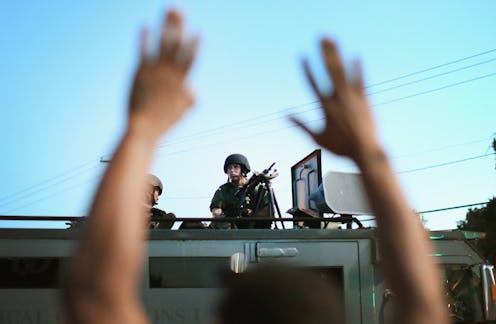News
Missouri Now Has A "Ferguson Commission"
Speaking at Florissant Valley Community College in Ferguson Tuesday, Missouri Governor Jay Nixon announced a "Ferguson Commission" will be created. Nixon commented that the commission would undertake a "thorough, wide-ranging and unflinching study" on the societal and economic factors in Ferguson relevant to the death of Michael Brown, the unarmed black 18-year-old shot to death by Officer Darren Wilson on Aug. 9.
Brown's death sparked an ongoing, impassioned protest movement centered around police brutality, in the face of a militarized and often-aggressive response from Ferguson and St. Louis County police.
In truth, it's hard to know precisely what to make of this news until further information is released, or the Ferguson Commission's work bears some fruit. Details are still pretty scant about what precisely they'll be examining, and what this all means in the most meaningful, practical sense. Nixon did try to emphasize the job they'd be doing as a challenging and reflective one — "not for the faint of heart," he called it — but the specifics of how they'll approach all this is still in the waiting. And, talk of commissions aside, countless Ferguson protesters are still left with an enormous unanswered question: What’s going to happen to Darren Wilson?
According to KDSK, Nixon will be forming the new Ferguson Commission through an executive order, and will be fielding suggestions for people who’d be good choices to join. The selections will reportedly be made and announced in early November, however, so time may be growing short.
The men and women selected to serve on this commission must be willing to come together in good faith, endure the fierce crucible of public opinion, and lead the hard work of change. They must be willing to talk candidly and openly, and — more importantly — to listen to what those on every side have to say. These are difficult conversations that for far too long have been avoided or ignored.
Boiled down to the barest elements, the big question regarding the Ferguson Commission will likely be this: will it cast a withering glare on the militarized actions of local and county police in the aftermath of the Brown shooting, or will it be used as a means to equivocate about the appropriateness of that response? In truth, it's impossible yet to say. But Nixon did highlight both the fears of black youth, and the fears of the police and their families, according to MSNBC's Trymaine Lee, and was clearly striving to strike a middling, centrist tone in his announcement.
Legitimate issues have been raised by thoughtful voices on all sides. Shouting past one another will not move us to where we need to go.
Of course, this is all somewhat after the fact — whatever the commission will end up doing or saying, they won't actually be assessing or investigation Brown's death, as Nixon noted. And the conversation raised by the Ferguson protests isn't just about what happens after a fatal shooting, but why the shooting occurred in the first place. It's why the hashtag #BlackLivesMatter has become a hallmark of the protests — confronting the racial fears, paranoias and prejudices which seem to allow little margin for error when black people encounter law enforcement, especially in contrast to when white people do. The #BlackLivesMatter hashtag has also been deployed in service of other controversially slain black men Kajieme Powell, John Crawford, and Vonderrit Myers , to name a few.
If the Ferguson Commission actually results in a meaningful alleviation of some of those tensions, then that would be a major victory for all involved. But make no mistake, the Ferguson protests have for months been fundamentally about Michael Brown, and the people like him who've similarly been killed. Whether Darren Wilson will stand trial for Brown's death is still a matter for a Grand Jury to decide, and everyone close to this story is likely waiting for that news with bated breath.
Image: Getty Images (3)
